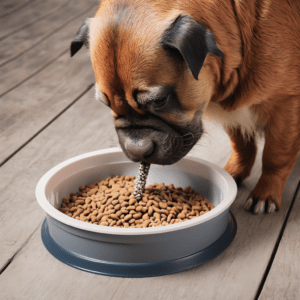Best wormer for puppies When it concerns worming pups, pet owners frequently believe that all kinds of wormers are made equal.
The truth, though, is far different. very vital to your beloved companion’s well-being and health to choose the correct wormer.
We’ll explore the specifics of puppy worming in this thorough guide, revealing the things to think about and the kinds of
wormers that are available to keep your puppy happy and healthy.
Understanding Puppy Worming
Getting puppies is a vital element of being a loving pet owner, rather than a routine duty. Puppies, while their lovely style, are quite vulnerable to parasitic infections such tapeworms, hookworms, and roundworms.
These bothersome intruders can seriously damage your dog’s digestive tract, resulting in pain, stunted growth, and in
extreme situations, potentially fatal disorders.
Vaccination your puppy is so essential and cannot be skipped.
There are a few things to take into account while choosing the finest wormer for your puppy. Since you are giving your dear friend a prescription, safety needs to be your first concern. Choose wormers made especially for pups, as adult-Strength items could be too abrasive for their fragile systems.
Another important consideration is effectiveness; you ought to choose a wormer than not only gets rid of the parasites
that are already there but also keeps them from coming back.

Things to Take Into Account While Selecting a Puppy Wormer
Let’s take a deeper look at the variables you should consider when selecting a wormer in your furry friend. First and foremost, consider the dog’s age and weight. Because different firms cater to various age and size puppies, verify that
the wormer that you choose is appropriate for your dog.
Take into account both the current health status of your puppy and any possible problems that may arise. For specific suggestions on wormers, please visit your veterinarian. Certain drugs and medical conditions may have an impact on the choice of wormer.
Another important consideration is ease of administration, particularly if that you’re first-time pet owner. Certain wormers are easy to dose because they come in tasty liquids or chewable tablets. Others could need more complex methods of administration, like topical treatments or injections. Select a wormer you are comfortable and confident giving to your puppy.
Not every wormer is made equal in terms of effectiveness.
Certain drugs target specific species of worms, while others offer broad-spectrum protection against a variety of parasites. Consider your puppy’s experience to different worm kinds and risk factors when selecting a wormer. When in skepticism see your doctor about what the best product is for your puppy’s needs.
Things to Take Into Account Before Selecting a Puppy Wormer
Making the right wormer choice for puppy is an important choice that needs thought and consideration.
To ensure the deworming process remains safe and effective, several critical factors must be considered.
to assist you
choose wisely for your pet, let’s take a closer look at these variables.
The weight and age of your puppy
The kind and quantity of wormer that you should use for your puppy will mostly depend on its age and weight.
To guarantee correct dosage,
puppy wormers are frequently designed based on weight and age categories.
Puppies may be exposed to higher amounts of active chemicals when using wormers designed for older dogs or larger breeds.
On the other hand, applying a wormer designed for tiny puppies to a larger underdosing, which makes the medication useless.
It is important to always heed the advice of the manufacturer and speak with your physician when choosing the right
wormer for the weight and age of your puppy.
Medical History and Current State of Health best wormer for puppies
It is important to take your puppy’s medical history and general condition into account before giving them any medication. Wormers may interact with certain illnesses or medications, perhaps leading to negative responses or problems. Relevant long tail keywords in this context include “Selecting the best puppy wormer” and “Creating puppy health: Worming solutions.”
To ensure the integrity as well as efficacy of the medication, check with the doctor prior to deworming your puppy if it
has any pre-existing medical disorders or is presently on medication.

Risk factors and exposure to parasites
Your choice of wormer should also take into account the environment in which your puppy is raised and the degree of
parasite exposure.
Puppies who interact closely with other animals or spend a lot of time outside may be more susceptible to parasite infections.
Furthermore, because to crowded and unhygienic settings, puppies from birthing facilities or shelters might be more vulnerable to parasite illnesses. When choosing a wormer, take into account your puppy’s lifestyle as well as the
particular parasites that are common in your area.
Extended Tail Here, “working puppy deworming methods” and “Optimal puppy worming strategies”. Your veterinarian
can offer insightful information on the parasites that are most prevalent in your area and suggest suitable preventive measures.
Ease of Administration
Puppies can be difficult to give medicine to, especially for initial pet parents. As a result, when making decisions,
consider how easy it will be to administer.”Best worming solution for little breed puppies” as well as “Fast-acting puppy dewormer for rapid relief” are of interest here.
Whether your puppy prefers liquids, tablets to chew, or topical treatments, choose a wormer that they will take easily.
Certain wormers are formulated with flavors to attract puppies, but others could need more complex dosage methods.
When choosing a wormer, take into account your puppy’s disposition as well as your comfort level when giving medication.
Security and Adverse Reactions
It’s crucial to put safety first when choosing a wormer for puppy. Even though the majority of deworming drugs are
thought to be safe when taken as prescribed, adverse effects are nevertheless possible.
There are certain instances of this, such as “side outcomes of dog wormers” and “the other side effects of dog worming pills.”
Dewormers frequently cause nausea, allergies, or seizures as side effects. It is essential that you research the possible
adverse effects of any wormer you select and keep a watchful eye on your puppy following medication. Kindly get in touch with your veterinarian right away if you observe any strange symptoms or reactions.
Types of Puppy Wormers
Regarding deworming your puppy, there are various solutions available to you. Multiple advantages and unique issues for every kind of wormer.
To assist you in choosing the best puppy wormer for your pet, let’s examine the several kinds that are now on the market.

Oral Insecticides
Probably the most popular and practical method for deworming pups is to use oral treatments. These drugs come in
pill, chew, snack, and liquid formats, among other types.”Puppy getting liquid” and “Puppy worming tablets” are relevant in this situation.
Oral dewormers are generally easy to use and effective against a range of intestinal parasites.
To make certain things more appealing to you, some are even flavored. puppy, guaranteeing easy dosing.
But the rule is necessary that you
follow the manufacturer’s instructions to the letter and give your pet the right amount according to their weight and age.
Topical Interventions
Although topical treatments are less prevalent than oral drugs, they nonetheless provide a deworming option for puppies.
Typically, these treatments are given topically to the dog’s skin as sprays or spot-on solutions.
Here, “Puppy worming treatments at home” and “Puppy deworming treatment” are appropriate.
Topical therapies may not offer complete protection against internal parasites, even while they are effective against
external ones like fleas and ticks.
In case you decide to use a topical treatment, be sure the medication you select is explicitly labeled for deworming puppies.
Furthermore, exercise caution while using topical therapies because certain puppies may be allergic to specific chemicals.
Organic Solutions
Natural cures provide an alternative to traditional wormers for pet owners who desire a more holistic approach. “Natural solutions to chemical wormers” and “Natural puppy wormer” are relevant in this situation.
Herbal supplements, probiotics, also or dietary modifications targeted at bolstering the dog’s immune system and
enhancing gastrointestinal health are examples of natural dewormers.
Natural therapies can be easier on the immune system, but their effectiveness varies, so be sure to speak with your
dog’s vet before using them. Furthermore, choosing natural therapies requires patience because they may take long to work than prescription drugs.
Prescription Drugs
Sometimes a particular medication is given by the physician to treat a specific kind of worm infection in your puppy.
These medication may need a veterinarian’s approval to be purchased and are usually stronger than over-the-counter alternatives.
You can include “The dog wormer prescription” and “Puppy deworming medication” here.
To guarantee your puppy’s safety and effectiveness when using prescription dewormers, pay close attention to the
directions provided by your veterinarian. Furthermore, be mindful of any possible interactions or adverse effects with additional drugs your puppy could be on.

Combined Goods
“Best deworming option for small size puppies” and “Top-rated dog wormer for various worms” are pertinent examples
of combination wormers that provide protection against multiple parasite types at once.
These combination medicines could have a variety of active chemicals that target different parasites, giving your dog complete protection. But it’s crucial to carefully check the label to make sure the product is secure and appropriate for
the weight and age of your dog. For pet owners searching for convenient all-in-one deworming options, combination products may be a good choice.
How to Deworm Puppies at Home
After selecting the best wormer for the dog, it’s now time to begin the worming procedure. Although worming a dog
yourself is a simple process, it must be done carefully and methodically to guarantee both safety and effectiveness.
Let’s go over the procedures for deworming dogs at home and provide you some advice on how to make your deworming routine work.
Consult your veterinarian.
Consultation with the veterinarian is essential before starting any deworming therapy.They may provide important
information on which wormer is best for your puppy’s particular requirements as well as advice on dose and administration.
The articles “The dog worming treatment at house” and “By step guide to worming dogs at home” belong in this category.
Your veterinarian is able to additionally give you advice on how often to deworm your puppy according on their age, health, and risk factors.
Assemble Materials
assemble all required materials before starting the deworming procedure. This can contain “Puppy deworming surgery”
and “Puppy worming treatments at home” as well as the wormer of choice, a syringe or pipette for liquid meds, and toys or rewards to make the process more fun for your puppy.
You and the pet will experience less stress and a more streamlined process if everything is prepared in advance.
Use the Wormer
Carefully follow the manufacturer’s directions when giving your puppy a wormer. Here, “Fast-acting puppy dewormer for instant relief” and “Effective puppy worming methods” are pertinent. When administering a liquid treatment, weigh your
puppy to determine the appropriate amount, then measure it with a syringe or dropper.
Make sure your dog finishes the complete dosage of any tablets or chewable treats. To make the medicine seem more
appetizing, you can hid it in a tiny serving of food or your favorite delicacy.
Keep an eye out for adverse effects
Following wormer administration, keep a cautious eye out for any indications of negative reactions or side effects in your puppy. Lethargy, diarrhea, and vomiting are typical side effects.”Canine wormer back effects” and “side effects of
puppy worming tablets” can be comprised here.
While minor side effects are somewhat frequent and normally go away on their own, if you experience severe or
ongoing symptoms, you should call your veterinarian right once as they may be signs of a more serious reaction.
Observation
Repeating the deworming procedure on a regular basis might be necessary, depending on the kind of wormer applied and the advice given by your veterinarian.
Here, the terms “Puppy worming program” and “Puppy deworming schedule” are relevant. To provide ongoing protection versus parasites and to preserve your puppy’s general health and wellbeing, follow the recommended timetable. Depending on the specific requirements of your puppy, the doctor may advise you on how often to deworm them.
Natural Alternatives to Chemical Wormers
Natural solutions provide an alternative to chemical wormers for pet owners who want a holistic approach in puppy deworming. Without the use of artificial chemicals, these natural substitutes seek to strengthen your puppy’s defenses and encourage gastrointestinal wellness. Let’s examine some of the more well-liked holistic methods and natural therapies for deworming puppies:
Supplements with Herbs
For puppies, medicinal products can be a useful natural option for artificial wormers. “Herbal worming for dogs” and “Organic puppy wormer” are appropriate terms in this setting. In the past, several herbs—like wormwood, squash seeds,
and garlic—have been used to remove parasites originating in the digestive system.
These herbs can be added to your puppy’s food with the advice of a vet or natural pet care professional, or they can be
purchased as supplements.
When giving herbal supplements to pups, care must be taken because many plants can be poisonous in high dosages
or conflict with other drugs.

Prebiotics
Probiotics are good bacteria that aid in maintaining a proper equilibrium of gut microbes in pups as well as digestive wellness. “Natural digestion for puppies” and “Probiotics for dog deworming” fit in here. Probiotics can boost your puppy’s defenses and lower the risk of parasite infections by supporting a healthy gut flora.
Pet supply companies sell probiotic supplements made especially for pups. internet merchants. See your veterinarian for advice on the appropriate probiotic to suit the specific requirements of your puppy.
Nutritional AdjustmentsYou may help your puppy’s own immunity against parasites by implementing dietary adjustments.
The articles “Puppy nutrition for worm prevention” and “Natural puppy worming diet” are relevant in this case. Giving your
puppy with food that is well-balanced, ideal for their species, and abundant in fiber, healthy fats, and high-quality
protein will boost their defenses and improve their general digestive health.
Reducing the risk of parasite infection can also be achieved by avoiding processed foods, high-fiber diets, and artificial
chemicals.
See a holistic veterinarian or veterinary nutritionist to create a meal plan specifically designed to meet the diet needs of your puppy.
Vital Oils
Certain essential oils can be used to resist and get rid of parasites in puppies since they naturally contain antiparasitic
characteristics.You can include “Natural parasite prevention for puppies” and “Essential oils for dog deworming” here.
To help deter ticks, fleas, and other parasites, essential oils like peppermint, lavender, and cedar wood can be reduced
and applied directly to the dog’s collar or bedding.
Furthermore, a pest-free atmosphere can be produced indoors by diffusing certain essential oils into the air.
Puppy safety when using essential oils is very important because these animals can be highly allergic to strong smells
and some of the chemicals can be harmful if consumed or used topically.
Homeopathic Treatments
Another organic method of deworming puppies is that homeopathy, which or stimulates the body’s own healing
processes by providing highly diluted medicines. The terms “Natural parasitic treatment for dogs” and “Natural deworming for puppies” are pertinent in this context.
Ingredients like Cina,
Filix the mas, or Spigelia, which are thought to have a knack for ejecting intestinal parasites,
may
be included in homeopathic treatments for deworming.
These remedies can be given topically to puppies under the supervision of a licensed homeopathic veterinarian.
They come in liquid or pellet form.
Tips for Maintaining a Worm-Free Environment
Your puppy’s health and wellbeing depend on keeping an environment free of worms and preventing reinfestation.
You may reduce the danger of parasite illnesses and guarantee your puppy’s continued happiness and health by
putting proper sanitation and environmental management methods into effect. The following advice can help you keep your pet’s environment free of worms:
Exercise Frequent Cleaning
Keeping a clean living space for your dog is vital for avoid the development of worms.
Flea egg yolks, eggs,
and young fleas can be destroyed by regularly vacuuming carpets, rugs, and upholstery.
Extended Tail Here, terms like “Cost-effective puppy dewormer for cautious owners” and “Effective natural solutions for puppy worming” make sense. Clean the bedding.
To regularly eradicate any parasites that may be present and their eggs, wash blankets and items in hot water. Additionally, to avoid parasite and fecal matter contamination, clean the bowls for food and water every day.
Get Rid of Waste Correctly
It’s critical to properly dispose of pet waste to stop parasites from spreading across your yard and the surrounding area. Here, you can include “Keeping a worm-free garden for puppies” and “Avoiding parasitic contamination outdoors.”
When your puppy poop outside, always clean up after them and throw away the feces in sealed containers in the trash.
Feces may attract insects and create an atmosphere that is conducive to infestation, so try to avoid leaving them in the yard. Think about setting up a special system for disposing of pet waste or processing pet waste somewhere separate from food.
Maintain Proper Hygiene
Keeping a clean environment is crucial to lower the risk of parasite infections in both humans and puppies. “The Prevention parasite transmission to humans” and “Hygiene measures for puppy owners” are pertinent in this context. After touching your puppy or washing up after them, give your hands a good wash with soap and water.
Refrain from letting your puppy lick your lips or face as this might spread bacteria and parasites. Regular nail trimming will stop your dog from scratching and perhaps infecting others or themselves with parasites.
Put Pest Control Measures Into Practice
Putting pest management measures in place can aid in preventing flea, tick, and other parasites in the yard and house. You can include “Prevention of infestations of fleas in puppies” and “Effective control of parasites for puppies” in this section.
Throughout the year, keep your puppy safe from external parasites by using flea and tick avoidance advised by your veterinarian.
Additionally, treat outdoor places where worms may thrive by using pesticides and repellents that are safe for pets. For advice on the safest and most efficient pest control solutions for your puppy’s particular requirements, speak with your veterinarian.
Plan Frequently Occurring Veterinary Exams
It’s critical to have routine veterinary examinations to track the dog’s health and identify any early indications of parasite infestations. The phrases “Regular veterinary checks for parasite screening” and “Preventive wellness for puppies” are relevant in this context.
Your veterinarian is capable of fecal tests to check for the presence of intestinal parasites and recommend appropriate
deworming treatments if necessary. Additionally, discuss your puppy’s lifestyle and risk factors with your veterinarian to develop a personalized parasite prevention plan.

Conclusion
It is vital for your puppy’s well-being and health to stay clear of parasites and worms. You can prevent infection by parasites in your pet through being aware of the various wormers that are available, developing how to worm dogs at
home, searching into natural wormer options to chemical ones, and placing methods aside to keep your furry friend’s surroundings worm-free.
We’ve covered all the important details about deworming puppies in this article, such as the kinds of wormers that are
available, what to look for in a wormer, and how to keep your home free of worms.
“Comprehensive guide to puppies deworming” along with In this case, “critical tips for puppy disease prevention” make sense. Remember to speak with the doctor for suggestions and guidance that are specific to your puppy’s demands.
You can ensure the long-term wellness and health of your pet by keeping to good sanitation standards, bathing on a
regular basis, taking steps over pests, and making regular trips to the vet.
By being informed and taking preventive steps,
you can give your puppy the finest care and ensure that they live a life
free of worms and worms.











